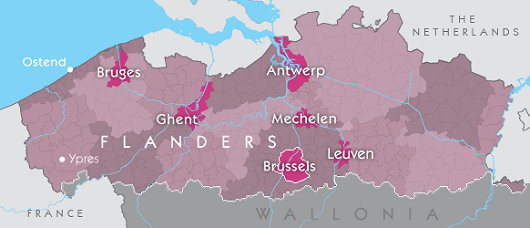
About Andrew Cusack
 Writer, web designer, etc.; born in New York; educated in Argentina, Scotland, and South Africa; now based in London.
Writer, web designer, etc.; born in New York; educated in Argentina, Scotland, and South Africa; now based in London. read more
News
Blogs
Reviews & Periodicals
Arts & Design
World
France
Mitteleuropa
Knickerbockers
Argentina
The Levant
Africa
Cape of Good Hope
Netherlands
Scandinavia
Québec
India
Muscovy
Germany
Academica
Solution «N» for Flanders?
Matthias Storme’s thoughts on keeping Flanders in the E.U.

PURSUANT TO OUR previous discussion of the dissolution of the confederal Hollandic archipelago in the Caribbean, the ever-interesting Flemish philosopher & university professor Matthias Storme suggests an interesting solution to the Belgian question. Opponents of Flemish secessionism frequently argue that should Flanders gain independence from Belgium, it would not automatically continue its membership in the European Union and would be forced to seek re-admission on its own. Professor Storme posits what he calls Solution «N», which has its basis in the Charter for the Kingdom of the Netherlands and Article 355, Paragraph 3 of the Treaty on the Functioning of the European Union.
As it currently stands, the Charter for the Kingdom of the Netherlands (plural) details the relationship between four separate countries — Netherland (singular, in Dutch Nederland rather than Nederlanden), Aruba, Curaçao, and Sint-Maarten — in a single monarchy under the House of Oranje-Nassau. These four countries maintain autonomy in various areas of concern while maintaining a common nationality, foreign policy, and defence arrangement.
Prof. Storme suggests that were Flanders to join the Kingdom of the Netherlands as its fifth country (while specifically delegating its powers in the realm of external relations to the Kingdom) it would continue to be part of the European Union. This is because the TFEU states “The provisions of the Treaties shall apply to the European territories for whose external relations a Member State is responsible”.
Article 355, Paragraph 3 is also the reason why the British colony of Gibraltar is part of the European Union while, say, Bermuda is not. The Channel Islands, meanwhile, were specifically excluded from the European Union. There is a great deal of complication on the relations of “British Overseas Territories” (as colonies are now known) and British Crown Dependencies to the European Union.
Professor Storme notes:
The Kingdom [of the Netherlands] would have six million citizens more and increase its economic potential by 50%. It would come closer again to the bigger countries with whom it would like to be treated more equally. …
Moreover, such a Solution « N » would be interesting not only for Flanders, but also for Brussels. Brussels could accede to the Kingdom of the Netherlands as a separate country (and not merely a separate region) without delegating more powers than those mentioned, without being “annexed” by Flanders and having its own say in the Kingdom. Such an accession would also not change its linguistic status.
Even for Wallonia, it would not be a bad idea to reflect about the possibility to join the Confederation, equally as a separate country.
Is this the ideal scenario for Flanders? Probably not in all respects, e.g. as it would not grant us a separate voice in the decision making procedures of the Union. That would indeed require a revision of current European treaties. But the solution would at least immunize us against the current “Francophone-Belgian” blackmailing.
An interesting speculation.
Search
Instagram: @andcusack
Click here for my Instagram photos.Most Recent Posts
- Burns Tower April 19, 2024
- Patrick in Parliament March 18, 2024
- Articles of Note: 13 March 2024 March 13, 2024
- Cambridge March 9, 2024
- Taken on Trust March 4, 2024
Most Recent Comments
Book Wishlist
Monthly Archives
Categories



What happens to the Belgian monarchy? Generally speaking, I would not favor a solution that would end the monarchy. We’ve lost enough monarchies already. Of course, I’m not Belgian.
The eventual union of Flanders with the Netherlands and/or Wallonia with France could only be argued for from the point of view of a linguistic nationalism with liberal roots which I find at odds with the overall traditionalist tone that permeates this blog.
Let’s not forget the two elements that unite Belgium: the monarch and Catholic religion.
Agreed. I am an anti-nationalist. Hence why I disapprove of moves for Südtirol to leave Italy for Austria.
I thought the whole Südtirol issue had long since died away?
Alberto correctly points out that the assumptions behind the Walloons uniting with France, and the Flemish uniting with the Netherlands largely rest on language; beyond that the peoples concerned have little in common to support any credible case for union with their respective neighbours.
It also seems clear that neither the Belgian Monarchy nor the Catholic faith is enough to unite Fleming and Walloon. I’m afraid that the political expediency of the Great Powers in cobbling together Belgium has long passed its sell-by date and the inherent and traditional contradictions of the Belgian state are now to the fore. As with Czechoslovakia and Yugoslavia, the forcing together of fundamentally different peoples can only (forcefully) work for so long, after which it’s a question of whether the split is acrimonious or bloody.
The French do not want Wallonia and the Dutch do not want Flanders, so the Belgians need to live with each other.
I am an anti-nationalist too. Hence why I hope in the next independence of the Northern Italy from the other part of the State. North and the South of Italy: two different countries in a single state. Padania free!